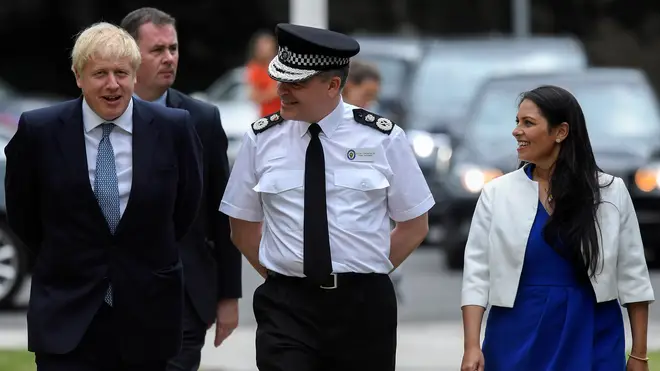
Ben Kentish 10pm - 1am
11 August 2019, 13:52
Priti Patel's promise to extend Section 60 stop and search powers "will provoke a riot", a criminology professor says.
Police forces across the country will have the power to stop and search anyone in a designated area, without needing reasonable grounds for suspicion in new extended powers announced by the Home Secretary Priti Patel.
Section 60 gives police the right to search people in a defined area during a specific time when they believe serious violence will take place, but Criminology Professor Dr Marian Fitzgerald has told LBC extending their power will lead to riots.
Speaking to Tom Swarbrick, Dr Mariam Fitzgerald said studies into the 2011 riots showed the use of these stop and searches had "gone through the roof" in each of the three months before the riots.
"Use of this power intensively in areas of London, with the encouragement of Boris Johnson and his deputy Kit Malthouse, was the backdrop to the riots in Tottenham," she said.
"These searches had gone through the roof in each of the three months before those riots.
"You have to make a distinction between this power, which can be used indiscriminately against anybody in the area, and that's why if you're intensively using it against certain groups in particular areas over and over, people who are going about their lawful business just come to the boil and you get the slightest trigger and it'll blow over.
"It's the Section 1 power that needs encouraging - where you have reasonable grounds for suspicion that will give you the arrests, that will take weapons off the streets, where as in the case of Section 60 - which will provoke a riot - less than 0.5% of those searches ended up with anyone being arrested.
"It is provocative, unnecessarily so...and so if you widen the net, you just provoke a riot.
"That's the bottom line and they know what they're doing."

It comes as Home Secretary Priti Patel promised police forces across the country the power to stop and search anyone in a designated area without needing reasonable grounds for suspicion, if they think there is a threat of serious violence.
"Stop and search works," she said.
"We hear again and again that our police need to be empowered.
"And as we're recruiting 20,000 more police officers we need them to be making sure that those who want to do harm are prevented from doing harm."
Section 1: A constable can stop and search any person or vehicle - with reasonable and "objective" suspicion that they will find something. It can’t just be because the person has previously been in trouble. The objective element could be based on intelligence, information or relevant facts.
Section 60: Gives police the right to search people in a defined area during a specific time period when they believe, with good reason, that: serious violence will take place and it is necessary to use this power to prevent such violence; or that a person is carrying a dangerous object or offensive weapon; or that an incident involving serious violence has taken place and a dangerous instrument or offensive weapon used in the incident is being carried in the locality.
Watch above.